
[Back to KeithStuff's Titanic Page]
Newton's Law & Real Art
It has been decades since a film has connected so profoundly and fundamentally with such a wide range of age groups as has "Titanic". Perhaps, you would have to go back to "Gone with the Wind" to find a picture so intensely appealing to human beings, regardless of age. The reasons why this film has made such an impact have been discussed from virtually every perspective. Some say it is the portrayal of the brief yet timeless love affair of Jack and Rose. Some say it is the epic, adventurous quality of the film. Some contend that it is the way Jim Cameron puts the audience right THERE, so realistically.
I take the favorable response (both critically and financially) to the picture for granted. It is an obvious masterpiece to me. So, the lavish praise it receives does not interest me nearly so much as the negative reaction to the film.
There exists a boisterous minority that dislike it. No, that is being too generous. This minority, for the most part, HATES the film. They truly despise its concept, its creation, its presentation and, most especially, its overwhelming success. This is not art, they say. It's not even a good imitation of a decent drama. It is a joke.
This attitude, whenever expressed, is often done so with a pervasive intensity that causes one to think the people are responding to an offering of Nazi propaganda. "Titanic" is not just bad, it is vile and must somehow be degraded if human artistic dignity is to be preserved on our planet.
This seems more or less to follow Newton's First Law of Gravity. As the intensity of acceptance for the film rises, so does the fervor of its faultfinding. Some examples: "Having forced myself to sit through Cameron's magnum hack-sterpiece, and in the face of the near unanimous, cloying (and frankly, quite annoying) acclaim which it has received, I feel I must draw attention to (the fact that Janet Maslin) lost any semblance of credibility she might once have had by stating that 'Titanic' equals and perhaps surpasses 'Gone With The Wind'."
Another: "What I object to is the unanimous declaration of '"Titanic"'s' unquestioned, original brilliance by the critical and popular media...Cameron's middling piece of bloated, over-indulgent filmmaking...paints light as if it were a crayon."
Such comments fit nicely with the spirit of these complete Web sites devoted to attacking the film: "Down with "Titanic", "James Cameron is a Hack", "Sink the Titanic", "The Titanic Sank, Let's Move On", "Titanic Rage!: Collide with Crap", and "The Titanic Blows".
Don't get me wrong, as I have said previously (see "A Brief Study of "Titanic"'), "Titanic" has its problems. But, they are of a minor nature and in no way diminish the genuine excellence of James Cameron's accomplishment.
I also don't mean to imply that everyone who dislikes/hates the movie does so without any degree of objectivity. The point here is to examine the flesh and blood of this backlash to the film. This will reveal several characteristics of the criticisms worth mentioning as one weighs their significance as opposed to all that whoo-rah about this splendid film.
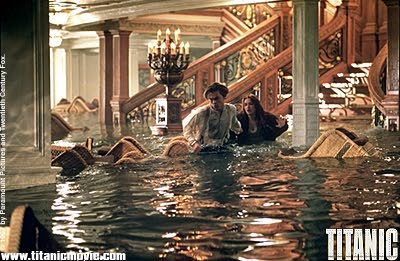
"Titanic"'s critics form a complex sub-culture of frustration and rage. They passionately believe that the film has no depth whatsoever, mainly due to the dialog, the screenplay, and poor acting. "Human values are either missing or so clunkily handled in 'Titanic' that they can make an audience cringe," wrote one reviewer. "We should recognize that the movie's human elements are entirely stale, however appealingly packaged," said another.
The cliches are characterized by many as follows: "All (Cameron's) defining characteristics can be (and probably were, prior to codification) run down in a laundry list under the heading 'Stock Working-Class, Romantic Lead', and are in no way particularly distinct from the general mass of characters who fall under the same heading, and which populate the various silly worlds evoked in any run-of-the-mill romance novel you might buy at the checkout counter of your local supermarket." Oooooh! That really hurts doesn't it?
Critics display a thin-skinned hypersensitivity to such dialog and action. "The ghastly lines made me cringe every time to two leading characters opened their mouths. When Rose says: 'I was screaming inside, and nobody cared,' I was also screaming inside "STOP IT!!! STOP SPEAKING!!! (emphasis not added)." Another wrote: "Most of the romantic words coming out of DiCaprio's mouth to express his affection are contrived, unrealistic, and even laughable. There was so much cheese in it that I almost choked." The great Gene Shalit himself pointed out the film's "drivel-driven dialogue."
A frequent thread through the anti-Titanic parade is the size of the budget ($200 million) and relating it to the alleged size of James Cameron's ego. "Cameron's over-weening pride has come unnecessarily close to capsizing this project," writes one moviegoer. They love to put Cameron in a bottle with comments like: "The man who made The Terminator for $6 million has become the high priest of Hollywood bloat. He is also the movie's mad toymaster: he keeps falling in love with an imposing machine that he then spends great amounts of time and energy destroying." They seem to have a profound concern for how the money was spent. "...his EXCESSES (emphasis added) were securing the original carpet patterns and dyes used on the original ship and commissioning the original carpet makers to make carpets for the film..."
Cameron is referred to as "megalomaniacal" possessing an "autocratic, authoritarian directing style." This is matched with the massive budget of the film: "The hype surrounding the 200+ million dollar budget has created a cheapness among movies. Movies were once about QUALITY (emphasis not added)." Apparently, Cameron's enormous ego (which sounds deranged at times) and his "excessive" budgetary demands have actually changed the value of filmmaking itself. My God! What power this man has! Furthermore, "what I object to is hearing Cameron called a genius because he managed to spend $200 million to build a 3/4-scale model of the boat, and then flood it (etc. ad nauseum)..."
Cameron has traditionally been an "action" film director. The human elements in his previous works largely play second fiddle to fantastic special effects, sensational futuristic happenings, or implausible events that characters sort of wade around in shallowly. Personally, that was my take on Cameron. Up to "Titanic".
Certainly, there is little genuine character development in the "Terminator" flicks, "Aliens", or "True Lies." "The Abyss" offers a human element that comes close to playing up to the cinematic effects and technical cradling of the lifeworlds involved. For the most part, however, Cameron has been a flashy, showy, "Hey, Look at THIS!" kind of director instead of the "I feel your pain" type. This "tradition" Cameron established for himself made it seem that all he really wanted to do was have personal fun putting together one thrill after another with no real human content.
That tradition, I believe, has affected the mindset of many who hate "Titanic". To be sure, there is a rich and marvelous technical aspect to the film. But, in "Titanic" instead of being showy, the special effects blend into the narrative along with the actors. Most of them never call attention to themselves and are extremely subtle. While not in any way futuristic they are probably the best of Cameron's career. Those who contend that "Titanic" is just another example of his inability to balance human engagement with the events being portrayed are just having a knee jerk reaction to the phrase "A film by James Cameron."
"Titanic"'s "critic-vision" is one of a pompous film, filled with bad acting and cliches, all under the direction of a man who knows nothing of quality and thinks only in terms of size and sensationalism. I think that's a fair characterization of the overall perspective so far. But there's more. The hype about the film (mentioned in another quote above) in itself is reason enough for it to be overrated. No matter what Cameron produced, it was publicized and marketed so much that it had to be bad. I confess, my thinking was long these lines at the film's release. But, I did finally give it a shot 12 weeks after it opened. My opinion was quickly changed. Too bad many of "Titanic"'s critics were not so open-minded:
"I have not seen 'Titanic', nor do I plan on seeing it, but I can say without hesitation, it is the worst movie ever made. I simply do not understand the fascination...It makes absolutely no sense to me."
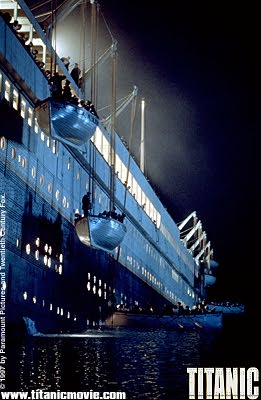 But what exactly are these "values" and "elements" the critics proclaim are missing? Some of them lie within the screenplay of the film. Over and over one finds reference to "the much too cliched plot, borrowed from much too old romances," "The first two hours drag on with cliche after cliche," and "Cameron just took a whole bunch of cliches that people would react to and slapped 'em on the screen." Never mind that the screenplay was chosen by the Writers Guild of America as one of the five best original scripts written for the screen in 1997.
But what exactly are these "values" and "elements" the critics proclaim are missing? Some of them lie within the screenplay of the film. Over and over one finds reference to "the much too cliched plot, borrowed from much too old romances," "The first two hours drag on with cliche after cliche," and "Cameron just took a whole bunch of cliches that people would react to and slapped 'em on the screen." Never mind that the screenplay was chosen by the Writers Guild of America as one of the five best original scripts written for the screen in 1997.
 So, what is in question here is the presentation of romance in the action and dialog of the picture. We'll return to this later, but first, it should be pointed out that many hate the film because they simply do not like James Cameron or his ambitious projects. "In my mind," one espouses, "James Cameron is no better than any of the countless 14 year old fans who tell me to shut up because I run an anti-Titanic site."
So, what is in question here is the presentation of romance in the action and dialog of the picture. We'll return to this later, but first, it should be pointed out that many hate the film because they simply do not like James Cameron or his ambitious projects. "In my mind," one espouses, "James Cameron is no better than any of the countless 14 year old fans who tell me to shut up because I run an anti-Titanic site."
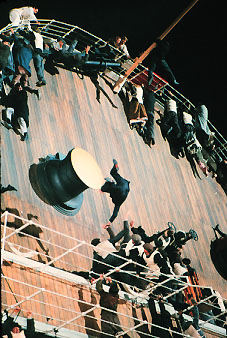 It is not the intent of this piece to justify that conclusion (see my "Study" for that). Suffice it to say that, just as Cameron has developed a following over the years with people who like "techy" flicks with pizzazz, there is another group that think he's all flash with no human punch. I used to be amongst their number myself.
It is not the intent of this piece to justify that conclusion (see my "Study" for that). Suffice it to say that, just as Cameron has developed a following over the years with people who like "techy" flicks with pizzazz, there is another group that think he's all flash with no human punch. I used to be amongst their number myself.
Why not? Why is it so difficult for the anti-"Titanic" gang to understand the reason "Titanic" is the highest grossing film of all time? Why is it so difficult to grasp what is apparently so obvious to the rest of us? The primary reason can be found repeatedly in the rantings of "Titanic"'s critics. It is a rebellion or outright distaste for the old-fashioned Romantic Ideal brought about by a pervasive sense of cynicism in American society. Sound like an overblown assumption? How about these snips from the anti-"Titanic" mind:
"Romance, along with Leonardo's acting ability, is overrated. I am not a romantic person. My idea of romance is buying condoms together."
"It is utter crap for Jack to die and tell Rose that she'll live on and die in a nice warm bed. Love IS (emphasis not added) selfish and not the type depicted in the movie."
"...the actual division is two hours of drippy Edwardian princess-and-frog business, and the remaining hour-and-a-quarter is devoted to the things-smashing-and-people-dying gala that everybody REALLY (emphasis not added) wants to see." To term the highly realistic portrayal of the actual sinking as a "gala" speaks volumes on the degree of cynicism I'm talking about.
There is no clearer example of the inability of those with cynical underpinnings to appreciate the romantic nature of "Titanic" than: "It is nothing but the classic love story rehashed and stuck on a doomed boat. Rose sneaks off to spend time with Jack. Rose is told not to see him. Rose sneaks off again, she's told not to see him. Yadda yadda yadda just sink the damn boat already so I can go home." A humorous quote, perhaps, but no less revealing.
I consider myself cynical about much of life. It's hard not be with so many of our institutions (political and social) acting in ways that bring their own legitimacy into question. But, as John Fowles teaches us in "The Magus", there are two kinds of cynics; those who can still feel romantic love and those who are no longer capable of romantic love. I don't believe we truly appreciate the impact the pervasive national "funk", as President Clinton so aptly termed it, has had on the social evolution of the human mind. There are now millions of people on this planet who have embraced cynicism either by hazard or by choice to the extent that they can no longer relate to the traditional Romantic Ideal.
For example, to the romantic the "flying" scenes of Jack and Rose have obvious symbolic gravity and worth. Yet, a hallmark of cynicism is that symbols inevitably turn into mere signs, without relevance or meaning. One writes: "I have NO (emphasis not added) idea what we were supposed to get from the 'I'm flying' scene." How can this be?
There is not nearly enough "grit and grim" in "Titanic" to satisfy many cynics. It is not a seedy film, showing the dark undertones that cynics relish. It is a classic Romantic film in the traditional sense of the term. Meaning it is a narrative placing characters and the events surrounding them in a remote time and place. Further, the emphasis is on their emotional nature within an adventurous, heroic framework. There are many (most of "Titanic"'s critics I would say) who no longer connect with this. When it presents itself, especially in such a marvelous way as in "Titanic", it makes them sick with the smothering guilelessness of it all. Films like "Titanic" cannot communicate to them. They do not speak in cynical tones. Therefore, many who watch and despise "Titanic" do so out of deafness. There is not a cynical frame in the picture.
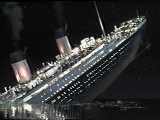 The only thing most of the critics seem to enjoy about the film is the last hour or so when the ship sinks. There is no connection with the first portion of the picture and, according to the critics, mostly it's because the dialog is too cliche. To the contrary, I will argue that what is being revealed here is not so much the cliche acting in the film, but the cynical inability to relate to it on its simple terms.
The only thing most of the critics seem to enjoy about the film is the last hour or so when the ship sinks. There is no connection with the first portion of the picture and, according to the critics, mostly it's because the dialog is too cliche. To the contrary, I will argue that what is being revealed here is not so much the cliche acting in the film, but the cynical inability to relate to it on its simple terms.
In addition to the cynics there's another group of the "Titanic sucks" sub-culture, the elitists. There is a long tradition of belief within certain art circles, particularly those of opulent or avant-garde membership, that truly great art makes great demands upon the individual appreciating it. This is certainly true with much of modern classical music, painting and sculpture. An average person without much interest in this type of art as "art" will likely scratch their head, cock it to one side and wonder, "What the hell is that?!" We know this happens everyday in theaters, museums, and galleries all over the world.
I am a lover of modern classical music, particularly chamber music that leans heavily on dissonance and is indifferent to orthodox forms of harmony. I find such work fascinating. The same can be said of the those who originally saw the genius of Picasso (displayed in the film, by the way), Pollack, Worhal and many others. The modern world is depicted in fractured, discolored, contrasting and chaotic tones. In many cases, these are brilliant insights into the "plight" of post-modern society and its endless sea of personal challenges and ills. Insightful yes, popular no.
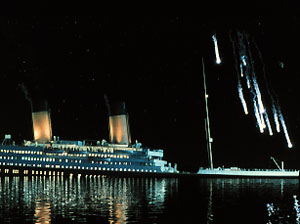 Just as the anti-Cameron folks have developed a habit seeing Cameron through tainted glasses of past experience, there is an artistic elite that pride themselves in relating to complex art forms that seem disorienting to many. Of course, that's part of the point in many cases. It's supposed to disorient you. But the average person doesn't necessarily realize that their reaction is actually part of the process of art.
Just as the anti-Cameron folks have developed a habit seeing Cameron through tainted glasses of past experience, there is an artistic elite that pride themselves in relating to complex art forms that seem disorienting to many. Of course, that's part of the point in many cases. It's supposed to disorient you. But the average person doesn't necessarily realize that their reaction is actually part of the process of art.
Elitists maintain what I will call a subtle arrogance about art. If Joe Schmoe can truly grasp it, it is demeaning to them. They rise above the uncultured masses to heights where hidden truths await within a framework of free-floating intelligentsia. For these people art, REAL art, has to be more than whatever it is that causes people to go back again and again to see "Titanic". Armed with this insight, these individuals are able to cast judgment ("critique" they would say) upon the ignorant masses that swarm into to theaters to be slapped across the face by an inexhaustible supply of cliches, bad screen writing, and horrifically awful acting.
First they establish their grounds for defining inferior art. "Using the 'Number Of People Who Watched' definition (would be like) 'The Jerry Springer Show' - the new ratings king of talk shows - would rank right up there with '"Titanic"', would it not?" The popular TV simile fits well into the elitist's psyche. "...this overblown movie should have been conceived as a network miniseries (where standards for excellence are lower)..."
Those who love "Titanic", who know its greatness, have in reality low standards we are told. They are "artistically challenged" I suppose. This is born out clearly in these two snips of cinematic objectivity:
"It takes a profound blindness - a willful, sentimental blindness, I might add, or else a manifest lack of life-experience to allow the warm, fuzzy feeling which 'Titanic's ending produces to wash away the various myriad of fundamental flaws in the piece. This is precisely why the film's fan-base is squarely set among adolescent girls, they are in a peculiar position to meet both qualifications."
"People are so stupid, they'll watch anything (and buy anything). I'm convinced you could sell spit on the sidewalk if marketed properly. "Titanic" is a whole ocean of spit."
What's more, these accusations are, in fact, rationally superior to anything "Titanic" fans have to say....
"...the pro-"Titanic" people either act childishly or shout, scream and crap around trying to sound like they are bonded forever to "Titanic", which is just a MOVIE (emphasis not added). On the other hand, most of the anti-"Titanic" people bring up well thought out arguments, witty criticisms and innuendo and most of all they are rational..."
Such rational arguments include: "Titanic is hyped up crap that takes no thought to comprehend and is as deep as a dixie cup and dammit I'm tired of hearing how brilliant it is cause its not...its damn mediocre."
Kenneth Turan of the L.A. Times believes the failures of the film are of such proportion as to reflect the entire film industry's tumble into the shabby art gutter with it. "...the flip side of '"Titanic"'s' ability to draw hordes of viewers into theaters is... (that) in its unintentional underlining of how narrow an audience net most movies cast over the American public, '"Titanic"' is not an example of Hollywood's success, it's an emblem of its failure."
According to Turan, people going to see "Titanic" are part of a "desperate mainstream audience" that will go goo-goo over "anything even resembling old-fashioned entertainment." This desperation, it is inferred, blinds them to the picture's overall mediocrity.
Anti-"Titanic" folks are comfortable in their snooty, gray-scaled rationalism. They know what REAL art is and what it isn't. One such person responded to me on a message board this way: "...the script is a big piece of crap and so-so acting. So, go waste your money on 17 more viewings of "Titanic" and ignore real movies like "L.A. Confidential" and "Good Will Hunting," because apparently you have been impressed by FAR LESS (emphasis added)." (Both aforementioned films are quite good, but not great. I will try to ignore the snippy ending to that comment).
Given all this, what could the real reason be for people liking what is termed "a big piece of crap?" The critics ponder this with their now familiar sense of cynical superiority: "Maybe the reason the movie is doing so well is because prolonged boredom caused its viewers to black out for two hours and remember only the fact that it has a fantastic sinking boat scene." What's this?! The use of the word "fantastic"?! Mind your tongue, sir!
"Titanic" puts it all out there in your lap. You don't have to think very hard to see its meanings or truths. It is, therefore, considered shallow by the elitists because it is simply not challenging enough to satisfy. Pure entertainment is OK, but that's the sort of thing you get on TV during soap operas or prime time. It's not the stuff you'll see showcased as containing "greatness."
"Titanic" is a great film of the Romantic tradition. It SPEAKS to our hearts and minds rather than mystifies, shocks or surprises them. From that perspective it is about a human innocence that is challenged not with corruption, violence or moral relativity, but with the simple fact of death itself, with the timelessness of our memories and hopes for touching the past.
Cameron himself tells us quite clearly what "Titanic" is when he writes in response to Kenny Turan's review: "The script for 'Titanic' is earnest and straightforward, wearing its heart on its sleeve. It intentionally incorporates universals of human experience and emotion that are timeless -- and familiar because they reflect our basic emotional fabric. By dealing with archetypes, the film touches people in all cultures and of all ages. Is this pandering? Or is it communicating? Turan mistakes archetype for cliche."
As do many others, I have pointed out, due to an approach to the film so cynical and elitist in nature as to be effectively deaf to what it is saying. The few critics that do, in fact, open themselves to the film cannot understand it or its appeal precisely because post-modernist influences have severed the connection with old-fashioned romance, rendering it as comprehensible today as Latin.
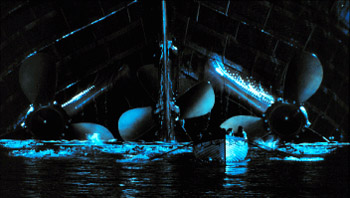 It is not attempting to be about the complex neurotic relationships that Woody Allen captures so well. It is not about the subtle anguish and symbolic, dreamlike longings of Ingmar Bergman. "Titanic" is not a film of dark power and conflicting values housed in gray emotional tones like Martin Scorsese produces. Most certainly, it is not in the realm of Quentin Tarantion or David Lynch with twisted, violent, rough-and-tumble, deconstructive numbness.
It is not attempting to be about the complex neurotic relationships that Woody Allen captures so well. It is not about the subtle anguish and symbolic, dreamlike longings of Ingmar Bergman. "Titanic" is not a film of dark power and conflicting values housed in gray emotional tones like Martin Scorsese produces. Most certainly, it is not in the realm of Quentin Tarantion or David Lynch with twisted, violent, rough-and-tumble, deconstructive numbness.
In the end, however, we come back to my original fascination with the genuine sense of hatred for this great film. I am forced to conclude, as I said about Newton's law in the beginning of this essay, that hatred is fueled by an ever-rising tide of human acceptance and praise for the film across the globe.
"But now it's just gotten out of hand," one critic whines. "People go to see it five, six, seven times (what do they think the movie'll end differently?)" I'll try to ignore the clear condescension there. But it gets harder to take as the comments continue to build. "The people go crazy about this movie and it's not that good. People go crazy over this film. This mediocre melodramatic shallow, easy to swallow and won't make you think film."
There you have it clearly displayed. REAL art has to be inaccessible. By definition it apparently must be "hard to swallow." It cannot be popular because it can only be appreciated by an elite few. "Titanic" is not REAL art because it has too much old-fashioned romance in it, not healthy in a cynical world. REAL art MUST make you think. Well, I agree with that last statement. And there's plenty to think about in "Titanic" as I have pointed out in previously (see my "Study").
All things considered, it is fitting to let Cameron have the final word on the question of "Titanic"'s greatness and the people who hate that greatness. "'Titanic' is not a film that is sucking people in with flashy hype and spitting them out onto the street feeling let down or ripped off. They are returning again and again to repeat an experience that is taking a 3-hour and 14-minute chunk out of their lives, and dragging others with them, so they can share the emotion. Parents are taking their kids, adults are taking their parents. People from 8 to 80 (literally) are connecting with this film."
That is an undeniable, tangible fact. Well said, Sir James. Let the quibblers blither and blow. They are of no consequence.
SPECIAL THANKS: To Carl B. for his welcomed insights and for information on Mr. Turan's and Mr. Cameron's duel in print.
Copyright © W. Keith Beason, 1998
Version 2.0